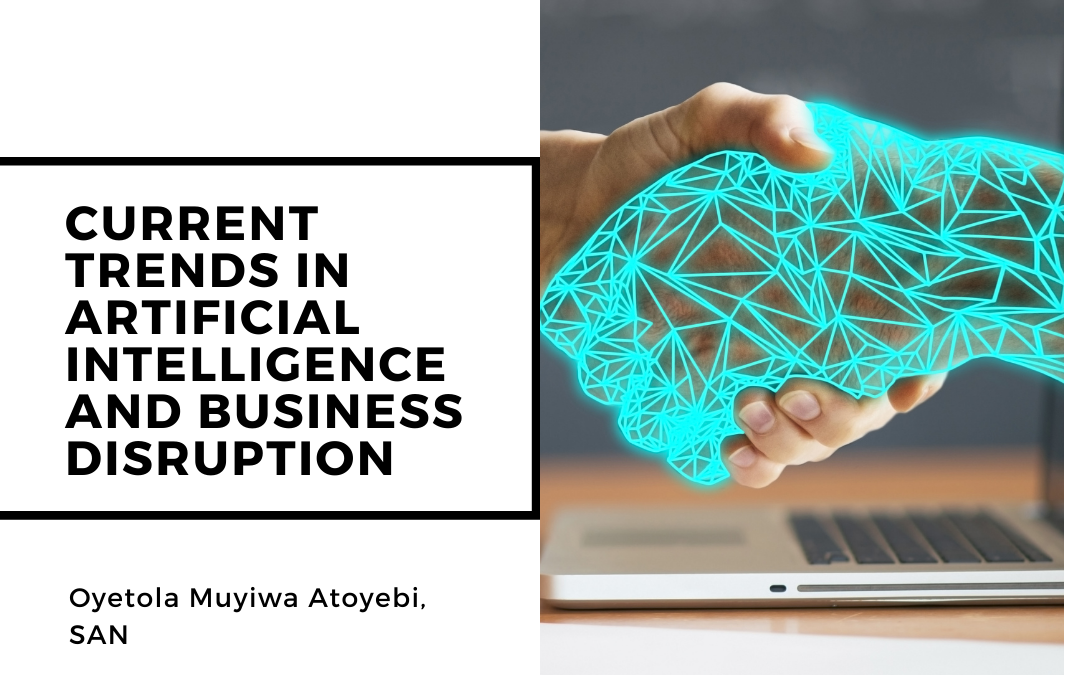INTRODUCTION
One of the most exciting and promising frontiers of technology today is Artificial Intelligence (AI). Any conversation around technology is incomplete without a reference to AI. While the term AI has been around for decades, in recent times, its application across industries, from healthcare, business and education to banking, among others, is changing the way we live and work both remotely and in the traditional sense. The increasing ubiquity of AI can be attributed to greater processing power and the declining cost of achieving these tasks at increased speeds. The adoption of AI has been so rapid that stakeholders and market leaders in technology across industries can no longer ignore it for long-term and sustained financial growth.
DEFINITION OF TERMS
Artificial Intelligence (AI) refers to the simulation of human intelligence in machines that are programmed to think like humans and mimic their actions. AI is intelligence, demonstrated by machines, unlike the natural intelligence displayed by humans and animals, which involves consciousness and emotionality.
Artificial intelligence (AI) is a wide-ranging branch of computer science concerned with building smart machines capable of performing tasks that typically require human intelligence. In simpler terms, it is making computers think like humans. The term is used to describe machines that mimic cognitive functions such as learning and problem solving.[1]
Business disruption refers to any innovation within an industry that radically and lastingly changes the way all companies in that industry operate. Disruption in business causes radical shifts in industries by offering unique, niche, more affordable, or untapped solutions to old or new problems. Sometimes, disruption upends existing markets; other times, it creates entirely new ones.
If you have ever thought about a piece of popular new software, app, or tech-based product that has skyrocketed in use recently, it’s likely that at some point, “you encountered it being described as “disruptive”. An example that will readily come to mind is Netflix, all other streaming services which are in the process of an ongoing disruption in the entertainment industry which are largely influenced by the slow extinction of video rental stores and are now responsible for the ever-growing cancellation of cable subscriptions worldwide.
CURRENT TRENDS IN ARTIFICIAL INTELLIGENCE
Technology has proven time and time again that it has come to stay, from the advent of computers, to mobile phones, to digitalization and now to Artificial Intelligence. The industry has gone through various degrees of failures and successes and it has finally picked up to the extent that it has started to affect and transform our way of doing business.
AI has begun already to reshape our modes of doing business in every major sector. AI is already being put to use to help with making data based decisions and synthetization on a scale much larger and faster than the human brain could accomplish. It has come to assist and aid with easier and faster ways of running the business and to increase productivity. Some of the ways AI is disrupting business and increasing value are:
- Data Access
Data is allowing AI be more adaptable. Data access enabling universality is one of the recent Artificial Intelligence revolutions. Reliable and accurate information helps businesses shift to AI-powered automated decision making. It has helped to cut cost of operation, labor saving processes, and improved the research capacity of organizations.
Data management systems and AI work hand in hand. When AI becomes fixed within and throughout the system, it has the potential to improve database query accuracy and performance, and to make maximum use of system resources, it is not limited. By executing queries in a more efficient manner, enterprises can lower the time taken to generate insight and improve business decisions.
For example, developers of the autonomous car software can access a lot of driving data without driving the vehicles. Soon, we will witness a drastic increase in the application of Artificial Intelligence in real-world situations. As AI becomes more sophisticated, it will cause cost-effective and widespread availability of crucial data.[2]
AI also helps in metadata repositories, that is the repository that provides a consistent and reliable means of access to data. AI powered programs can actively learn from expert user input and suggest terms based on previous human actions. The system can recognize the similarity between items in the data catalog and make suggestions on business terms to be assigned.
- Market Prediction
Artificial Intelligence is going to assist businesses in the use of information to prepare for outcomes and behaviors thus being more proactive. The biggest AI trend in marketing in 2020, is increasing focus on providing personalized services.
One of the most common ways that AI can do so, is through analysis of the activity of individuals online by the use of keywords. A business owner, for instance, may need insight on those in a certain area who search for the services they provide.
One of the primary benefits AI offers in these scenarios is the capability to provide real-time updates about your audience, allowing you to better personalize the way you target them.
- Customization and Marketing
The use of AI is helping companies and business to be able to personalize their services to their customers and to understand clients and their preferences more, due to the use of data. One of the primary benefits of AI, is that it is capable of providing real time information about your clientele which would allow you as a business owner to have more effective ways of targeting them.[3]
One of the most common ways that AI can do so, is through analyzing the online activity of individuals who search for certain keywords. A restaurant, for instance, may need insight on the demographic information associated with local customers who search for foods they provide.
One of the primary benefits AI offers in these scenario is the capability to provide real-time updates about your audience, allowing you to better personalize the way you target them. Citing Netflix again as an example, the streaming outlet uses AI to keep their customer base interested by making movie recommendations for their customers using their watching history or search history.
- Boost Cybersecurity
AI could soon be integrated with Cybersecurity, enabling better defense of data and networks from attacks and security solutions for end-users. The ability of AI to analyze a lot of information over a short period of time means threats can be detected a whole lot faster and more accurately. From tracking and preventing phishing, AI technology will boost the security abilities of all systems. In the future, AI will be able to predict if a transaction is fraudulent or not, thus preventing all types of cybercrimes, and increasing the system’s vigilance.[4]
The ability to analyze massive amounts of data using AI can pave a way for the development of systems capable of reducing cyber- attacks. Some AI programs can be used to identify unwanted data and noise which aid security experts to understand the cyber environment in order to detect and correct abnormal activity.
Similarly, the implementation of AI for cyber security solutions will help to protect organizations from existing cyber threats and identify new types of malware.
This has become even more important given the fact that, majority of our transactions are done over the internet, and it has become essential that adequate tools are employed to prevent data breach and protect our information.
CONCLUSION
These are some of the ways AI is causing disruptive innovation. It is clear that, there is a disruption of what the market used to be and creation of whole new market. Given a few years and not only with the value given by AI have improved, it would also drastically have changed the mode of operating businesses, delivering services and customer relationship. It is important that as business owners and professionals we begin to adapt and adopt the changes.
If left unchecked, these disruptions caused by AI may have enormous consequences for societies. This is enough reason for policymakers to look closely at technological progress; what it means for their countries and how best to intervene. Policies are needed to help workers adapt to the new reality and to ensure their participation in the benefits arising from technology.
However, despite continuing advances in computer processing speed and memory capacity, there are yet no programs that can match human flexibility over wider domains or in tasks requiring much everyday knowledge.

Mr. Oyetola Muyiwa Atoyebi, SAN is an exceptional Technology lawyer and thought leader with over a decade’s worth of experience in legal Practice and technology. He has facilitated numerous transactions and given countless legal opinions as regards tech in Nigeria, his outstanding performance has attracted international recognitions and awards. He is the youngest lawyer in Nigeria’s history to be conferred with the highly coveted rank of a Senior Advocate of Nigeria (SAN).
He is the Managing Partner of OMAPLEX Law Firm, an established law firm driven by Technology innovation. As an expert in emerging areas of law practice, he has core competence in information technology, cyber security, Fintech, Robotics and Artificial intelligence. He is described to be the go-to person when it comes to issues around tech.
The learned silk is best characterized as a diligent, resourceful and yet humble individual who is revered for his highly analytical and pragmatic approach to solving legal problems as well as an unwavering commitment to achieving client goals. Indeed, his hard work and dedication to his clientele sets him apart.
Beyond his interests in law, the learned silk is an avid golfer and a tech enthusiast.
[1] https://www.webopedia.com/definitions/ai/
[2] https://www.analyticsinsight.net/artificial-intelligence-trends-in-2020/
[3] https://www.analyticsinsight.net/artificial-intelligence-trends-in-2020/
[4] https://www.ibm.com/downloads/cas/MGJ2DLQV

